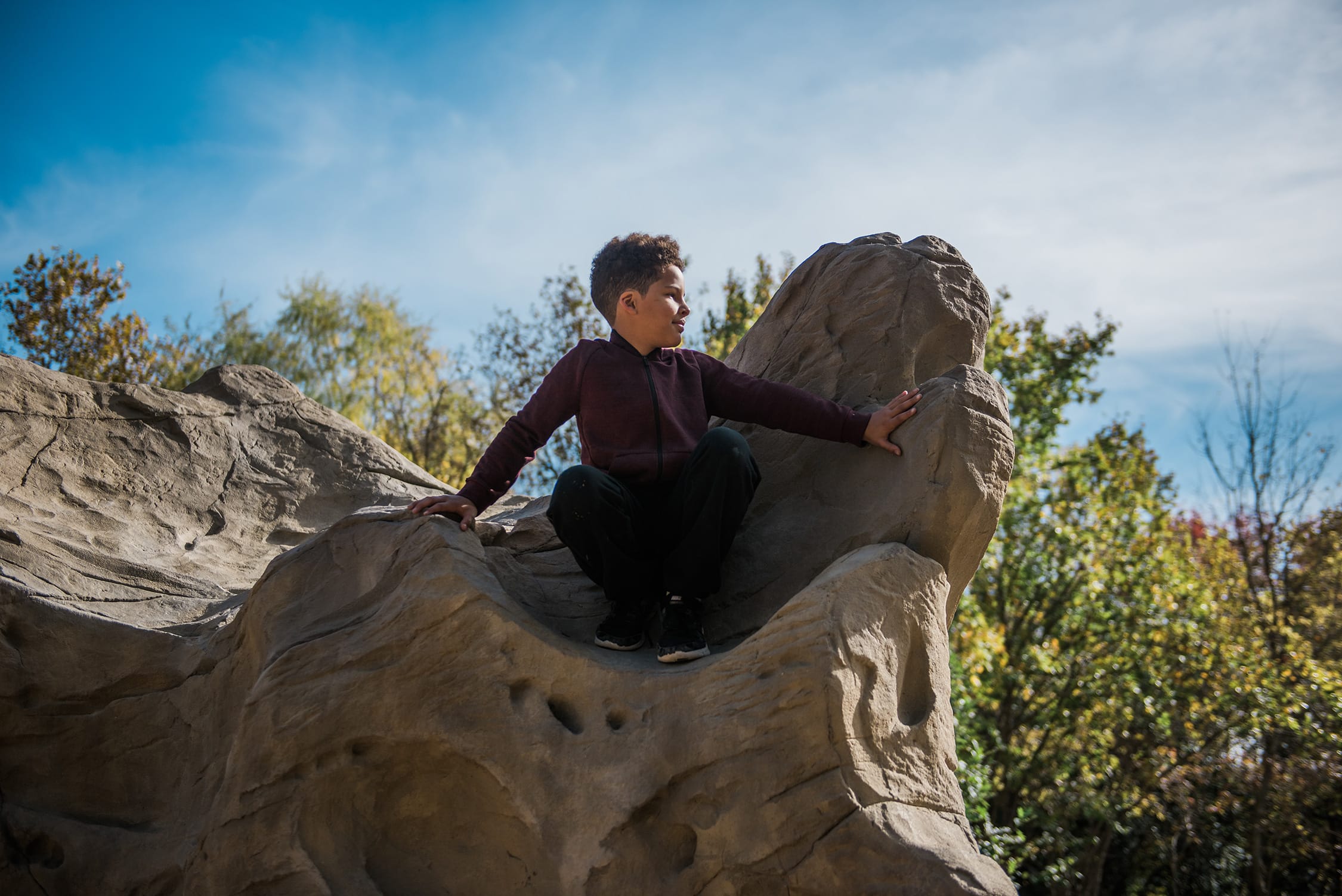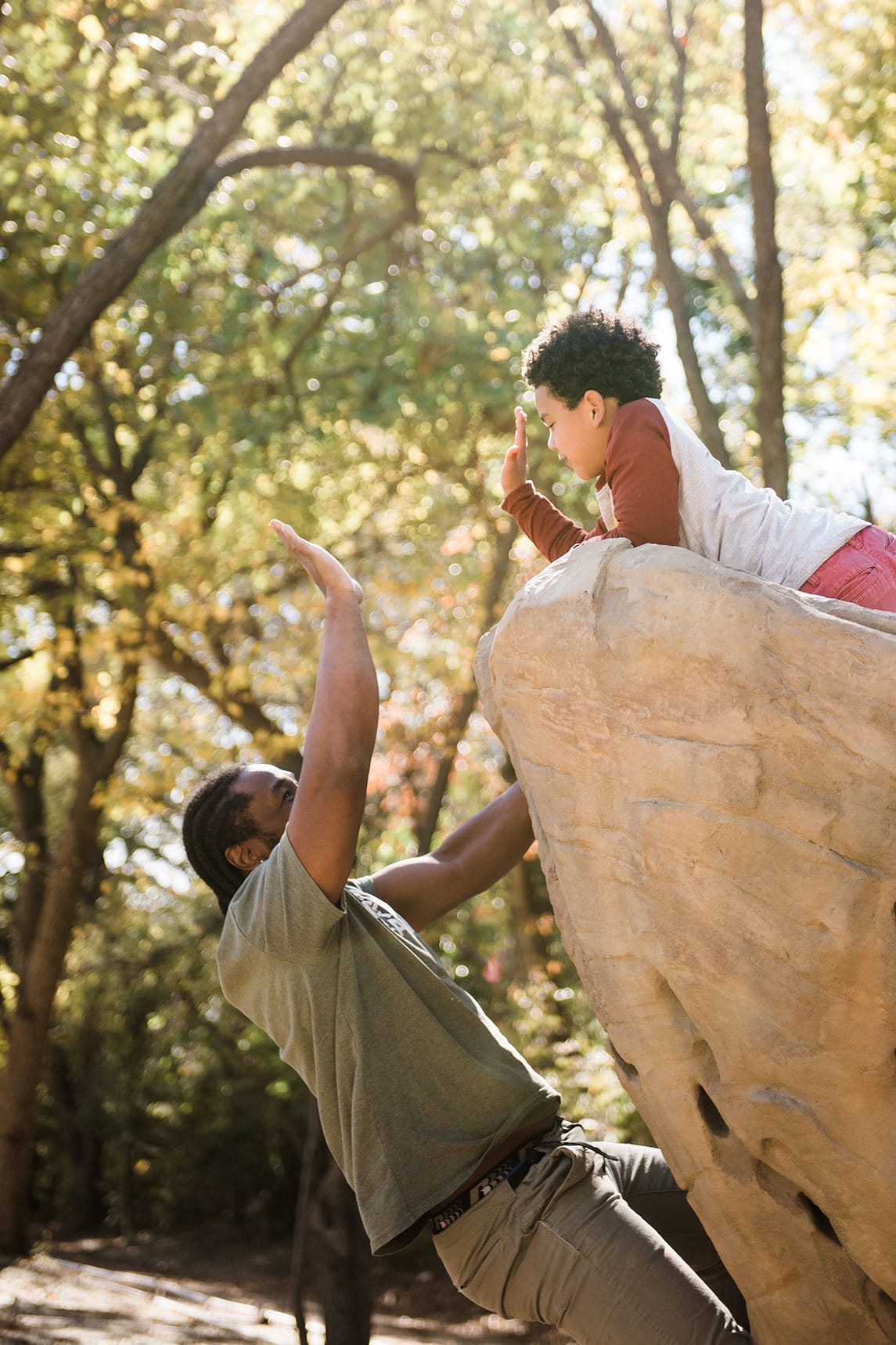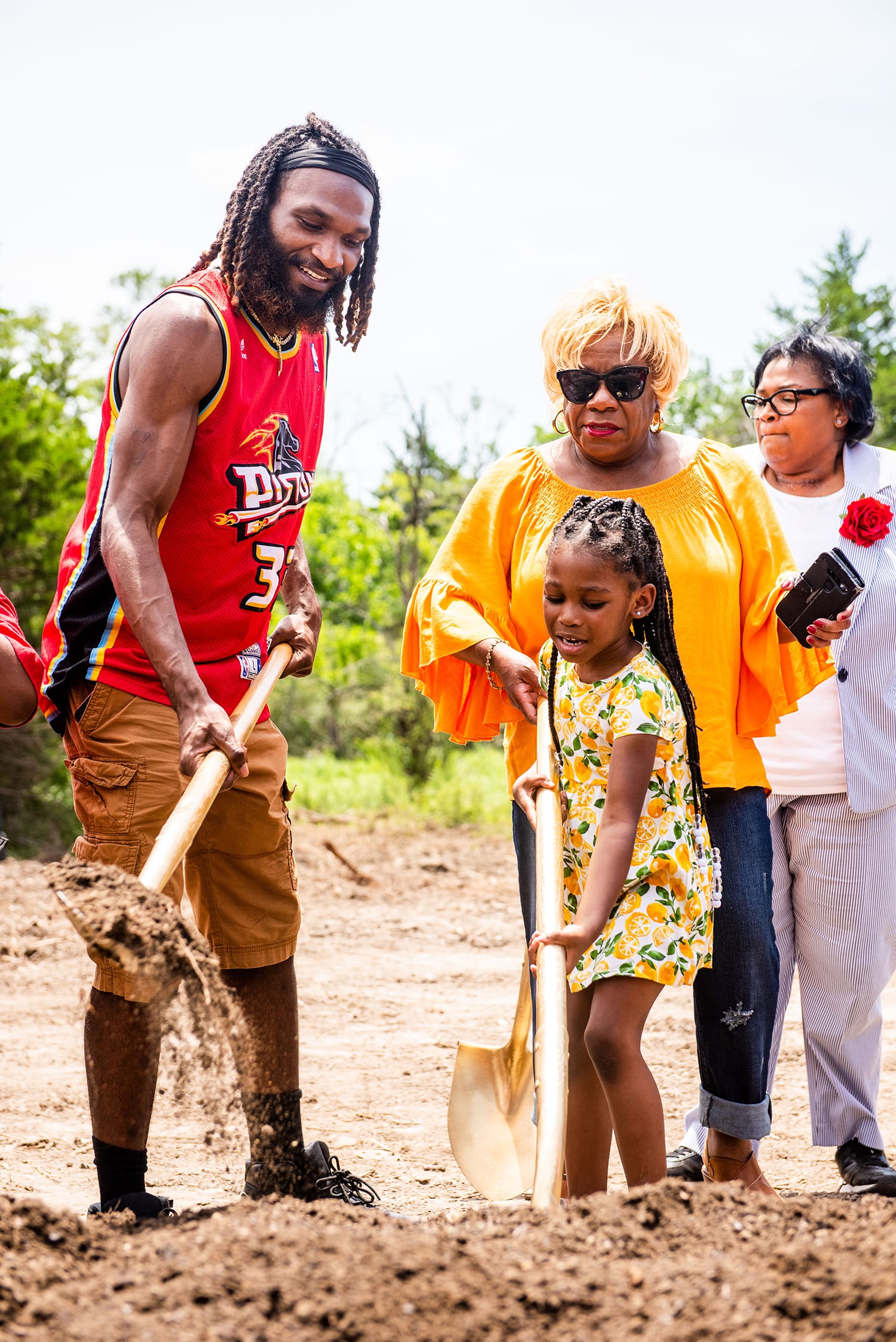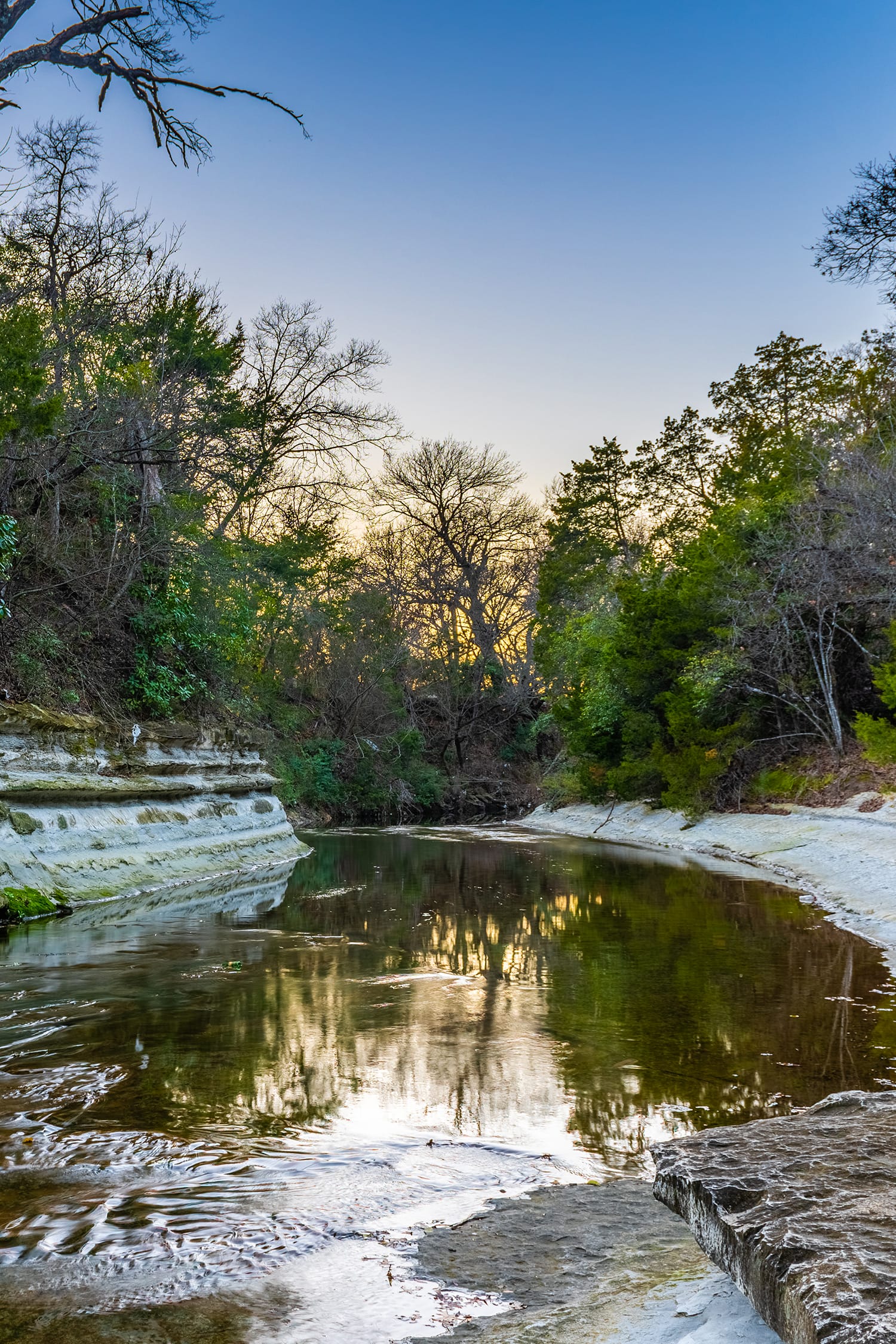It’s morning, but the sun is already shining bright and hot on a field in southern Dallas. It’s the kind of Texas day that wilts hairdos. It’s not the most comfortable, but there are still nearly 20 people on site, making arrangements for the forthcoming groundbreaking ceremony at Judge Charles R. Rose Community Park.
“It feels like a long time,” says Robert Kent, Trust for Public Land’s Texas state director, “but it’s actually pretty short to go from idea to breaking ground in six years.” Kent attributes that speed to the collaboration and teamwork of the various stakeholders involved with this project, many of whom are at the future park site with him.
They include Dallas Park and Recreation staff, landscape architects, an event planner, land stewards, other TPL staff, and a variety of local contractors. There’s even a Dallas city marshal on the scene, blocking a lane of traffic so everyone can park along Simpson Stuart Road.
The main event, the actual groundbreaking, is still a month away, in early June. But today’s well-attended planning session is a testament to the level of coordination and detail that defines not only this 40-acre park but the entire network of green spaces and trails that will ultimately become the Five Mile Creek Greenbelt. In other words, creating parks— and an urban greenbelt to connect them—is a major group effort. And that teamwork extends well beyond the agencies involved; in fact, the most important aspect of this project’s success has been the residents’ vision and their deep commitment to realizing it.
When completed, the greenbelt will link a historically underserved, largely Black population in Dallas to nearly 13 miles of trails, three parks, and 124 acres of outdoor space. Strange as it sounds, this ambitious concept sprang from a pile of detritus littering a creek behind a high school—and a community that demanded better for itself.
Rising temperatures, bigger storms, and asphalt schoolyards pose significant risks during recess. Urge Congress to prioritize schoolyards that cool neighborhoods, manage stormwater, and provide opportunities for kids to connect with nature today!
Oak Cliff Genesis
Murals projecting neighborhood pride in Oak Cliff are not uncommon: a prominent one reads “Oak Cliff Raised!” and depicts Yvonne Craig, costumed as Batgirl from the 1960s Batman series, a role for which she is best known. That sense of local dignity permeates South Oak Cliff High School, where another mural, designed by students, pronounces “Still We Rise” in capital letters across a parking lot wall, a nod to a poem by Maya Angelou.
But it wasn’t long ago that the community conveyed a less assured self-image. One sore spot was Alice Branch Creek, a tributary of Five Mile Creek that runs behind South Oak Cliff High School—and, now, along South Oak Cliff Renaissance Park. The creek had become a dumping ground for old tires, empty beer cans, and other refuse.
Data from the city’s safety and economic reports showed poor health and high crime rates in the area. And a report from TPL revealed that South Oak Cliff was a park desert: “We were shocked to find out that our zip code, 75216, had one of the least amounts of green space within a 10-minute walk of residents nationwide,” says Derrick Battie, a towering former NBA player and South Oak Cliff alumni who serves as the school’s community liaison.

Children enjoy room to run at South Oak Cliff Renaissance Park. Photo: Jason Flowers
In 2015, students protested poor conditions at the high school by staging a walkout; their outcry gained national attention, ultimately leading to a $52 million investment in a new facility. And the community didn’t stop with indoor improvements. To hear Principal Dr. Willie Johnson tell it, students here were just waiting for their first victory: “Once you start winning,” he says, “it becomes a mindset.”
“Once you start winning, it becomes a mindset.”
– Dr. Willie Johnson, principal of South Oak Cliff High School
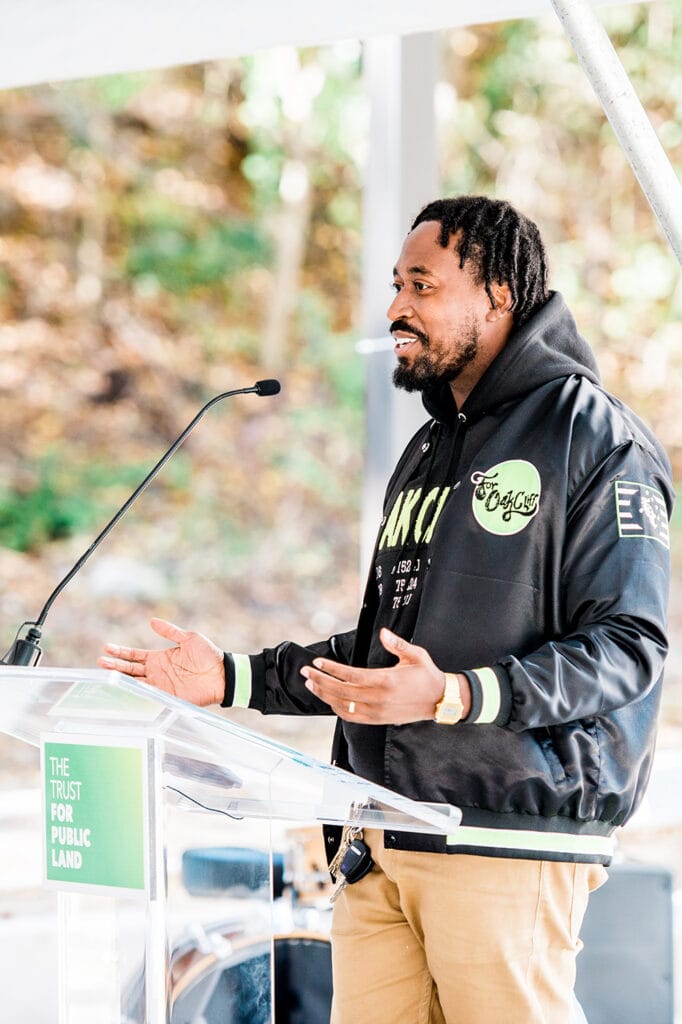
Taylor Toynes, founder of For Oak Cliff, speaks at the South Oak Cliff Renaissance Park grand opening event. Photo: Brittany Gryder
When students and alumni raised concerns about the polluted creek, Dr. Johnson got in touch with TPL, and plans for what is now South Oak Cliff Renaissance Park were hatched. “Trust for Public Land was very significant in getting this thing accomplished,” says Johnson (known to students as “Dr. J”). Battie adds that TPL staff came in with the understanding that the steering committee for the project needed to reflect the demographics of the community. “It can’t be . . . some non-Black faces in the Black community putting in a park,” he says. So TPL empowered locals to lead the effort.
The resulting 1.8-acre park, a mere six-minute walk from the high school down Overton Road, opened in November 2021, the miraculous timing of which was not lost on Taylor Toynes, founder of For Oak Cliff, a nonprofit that works to combat systemic oppression through education. “We got the park in the midst of a pandemic,” he says of working with TPL on community engagement. “That’s dedication.”
Toynes, who joined TPL’s National Board of Directors in 2021, sees green spaces as essential to well-being. “Everyone, no matter the age or person, race, creed, whatever, there’s one place that we all belong and that’s outside,” he says. “It’s the most natural space for you to be in. It provides you everything that you need to be in harmony, to be healthy.”
Currently, more than 186,000 people live within the Five Mile Creek watershed, but only about half have access to a park or trail within a 10-minute walk of home. Our Five Mile Creek Greenbelt project aims to improve on that, and if South Oak Cliff High School is any indication, positive change can happen quickly.
Johnson and Battie said people thought it would take a while to see the success related to the new school and nearby park. “We had a 100 percent graduation rate that first year,” says Battie. “Then a state [football] championship. I think we know a little something about winning in 75216.”
Serendipity in Highland Hills
Randy Bowman, founder of educational nonprofit At Last!, knows the regenerative power of the outdoors—for children especially. The organization provides kids from less prosperous families with resources, academic coaching, and a nurturing environment to help them excel in school and life. The At Last! boarding facility, where kids live during the school week, neighbors South Oak Cliff Renaissance Park.
“What we have across the creek in that park is not replicated in this area,” says Bowman, who previously owned the park site and helped TPL acquire it. “It also provides an outdoor sort of biology lab for South Oak Cliff High School and for our kids here, if we want to demonstrate things to them. There was no good reason not to do it,” he says of his decision to sell the land.
Given the demographic At Last! serves, Bowman says kids often have hard days. “Sometimes, that malaise spreads throughout the group,” he explains, “and you can say, ‘All right, tablets down, pencils down. We’re going to walk over to the park, and we’re going to take 15 minutes. And I want you to have as much fun as you can in that 15 minutes. Then we’re going to come back and get back on our stuff.’”
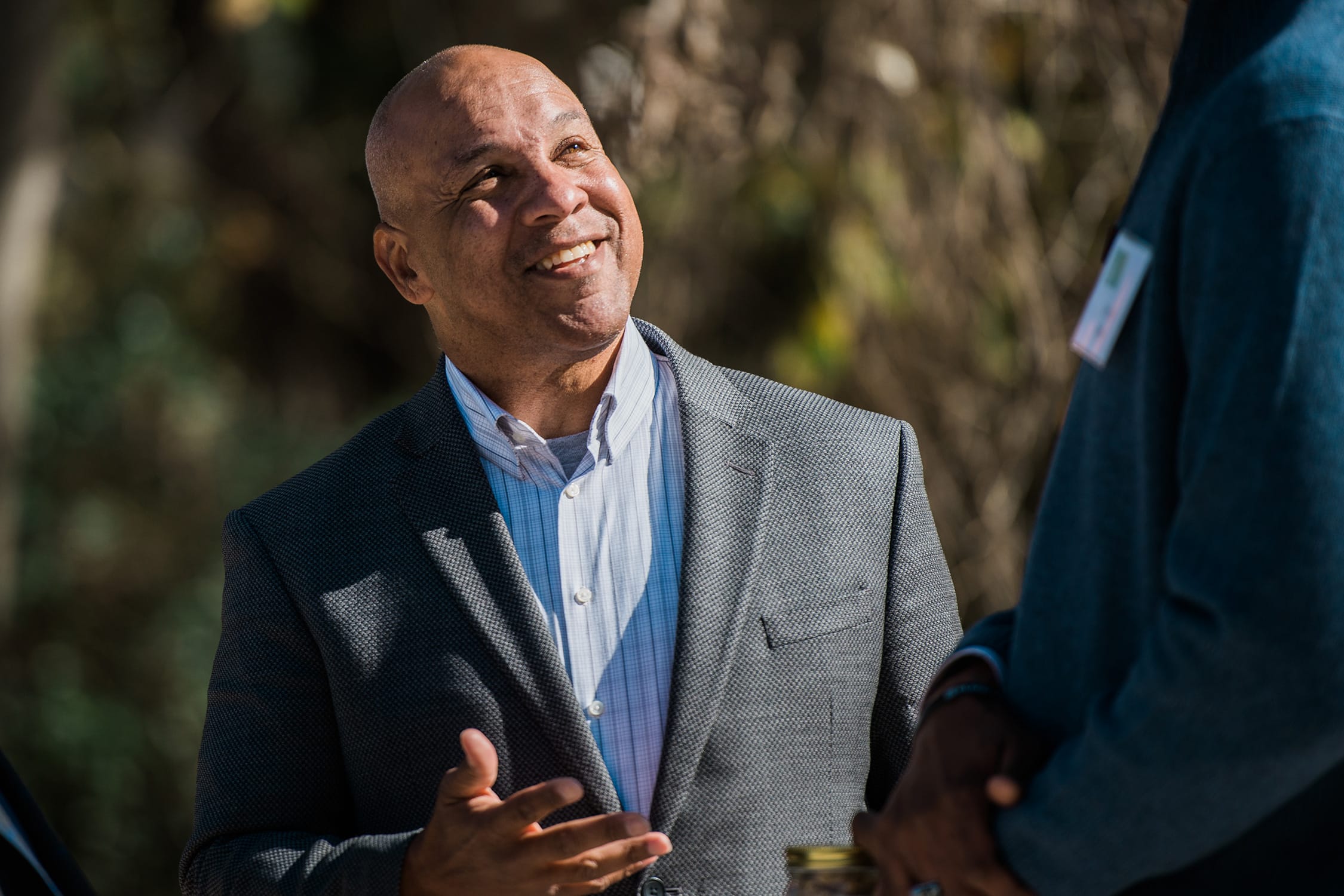
— Randy Bowman, founder of educational nonprofit At Last!
Judge Charles R. Rose Community Park is the next project to be completed in the Five Mile Creek Greenbelt (to be followed by Woody Branch Park, an 82-acre forest in Glen Oaks). It’s happening in stages, as funding becomes available. “We’re motivated that there are kids in that neighborhood right now who could benefit from that park,” says Robert Kent. “So let’s do the best we can, with what we can, now.”
Donate today to support a greener, more equitable future for Dallas.
When Judge Charles R. Rose Community Park is completed, the 3,567 Highland Hills residents who live within a 10-minute walk of it will have a place to exercise, breathe fresh air, and, “have a different perspective find [them],” as Bowman puts it. The first stage, which features an outdoor classroom and views of downtown Dallas, will open in 2023.
The park’s genesis was spurred by an unexpected triumph: around the time TPL bought the land for the park, the Texas legislature appropriated $1 million for a Judge Charles R. Rose Park to be created somewhere in Dallas County. Judge Rose, who passed away in 2019, was a beloved figure in Highland Hills, where his namesake park will exist. He served as a school board member and justice of the peace and “had a good impact on the neighborhood,” according to Kent.
This opportunity not only supplied funding to build the park, but it also strengthened ties between TPL and Highland Hills residents, who workshopped the park design over two years of community engagement to ensure the resulting green space matches their vision. In another serendipitous turn, the area is now represented in the Texas legislature by Rose’s daughter, State Representative Toni Rose. “Representative Rose has been a great champion for the project,” says Kent. “She’s been very involved”—just like residents.
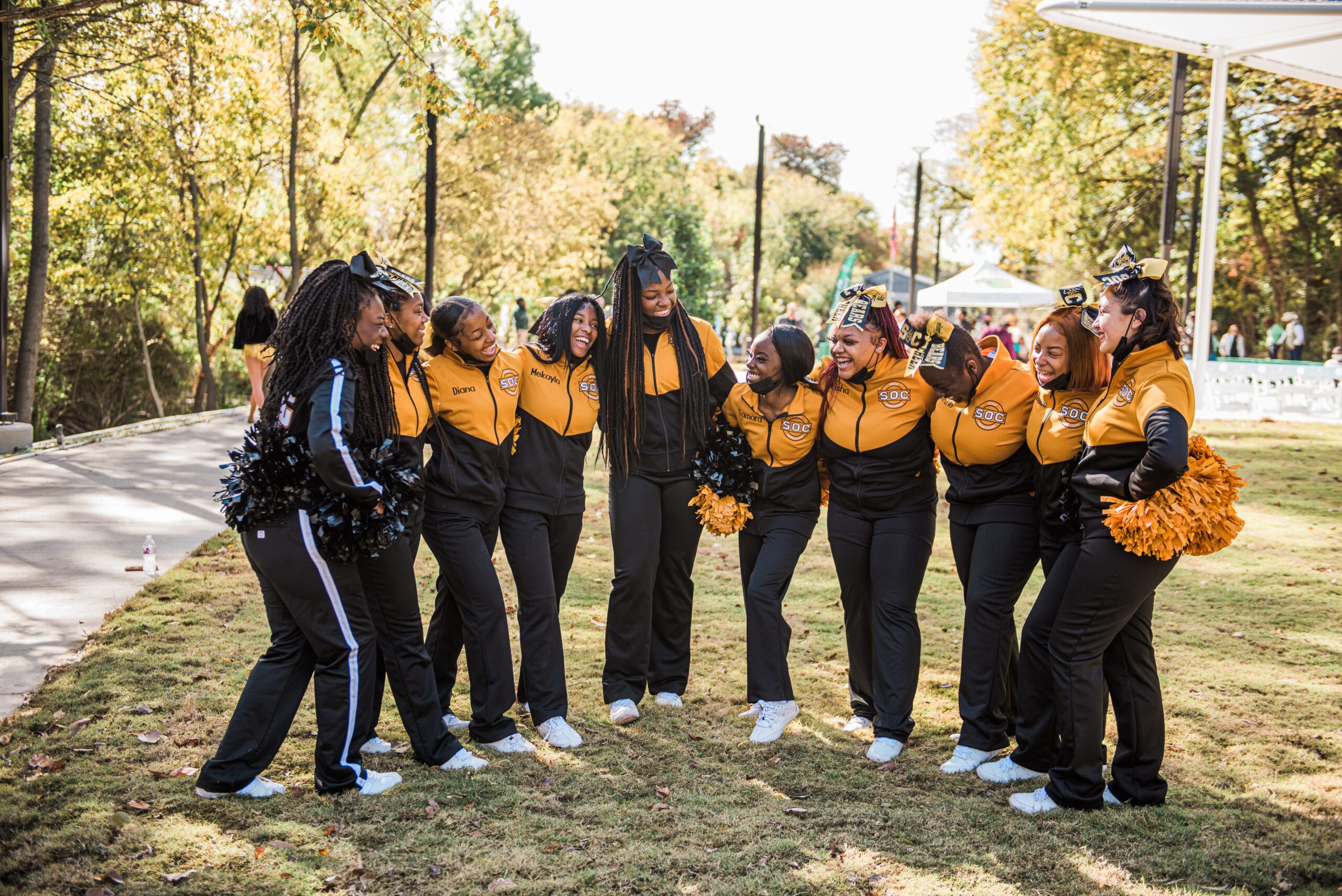
None of Us, All of You
Involvement is empowering; it cultivates pride in place and ownership. And, as Battie puts it, “When you give voice to disenfranchised communities, it gives other people the power and the confidence to speak out, too.”
Toynes says enriching outdoor spaces like those along Five Mile Creek indicates to young people they are cared for by their community, which reflects positively on where they’re from—and, in turn, on their perceptions of themselves.
“Success is an effort. Those things we’re talking about are so deep rooted. That’s going to take a lot. But what better place to do it than outside?”
– Taylor Toynes, TPL national board member and founder of For Oak Cliff
Partners and collaborators across the Five Mile Creek project emphasize the importance of listening and building trust by forming alliances. Toynes, Battie, Johnson, and Bowman agree TPL’s spirit of engagement set it apart in the eyes of community members who were used to broken promises. Relationships, they all say, are the foundation for positive change in southern Dallas. “That’s how Trust for Public Land operates,” says Battie. “None of us. All of you guys.”
When asked if the progress in his neighborhood signifies a breaking down of barriers, a challenge to the oppression he saw growing up, Toynes is thoughtful. “I’ve seen progress; can’t say that I’ve seen a breakdown,” he says. “Success is an effort. Those things we’re talking about are so deep rooted. That’s going to take a lot. But what better place to do it than outside?”
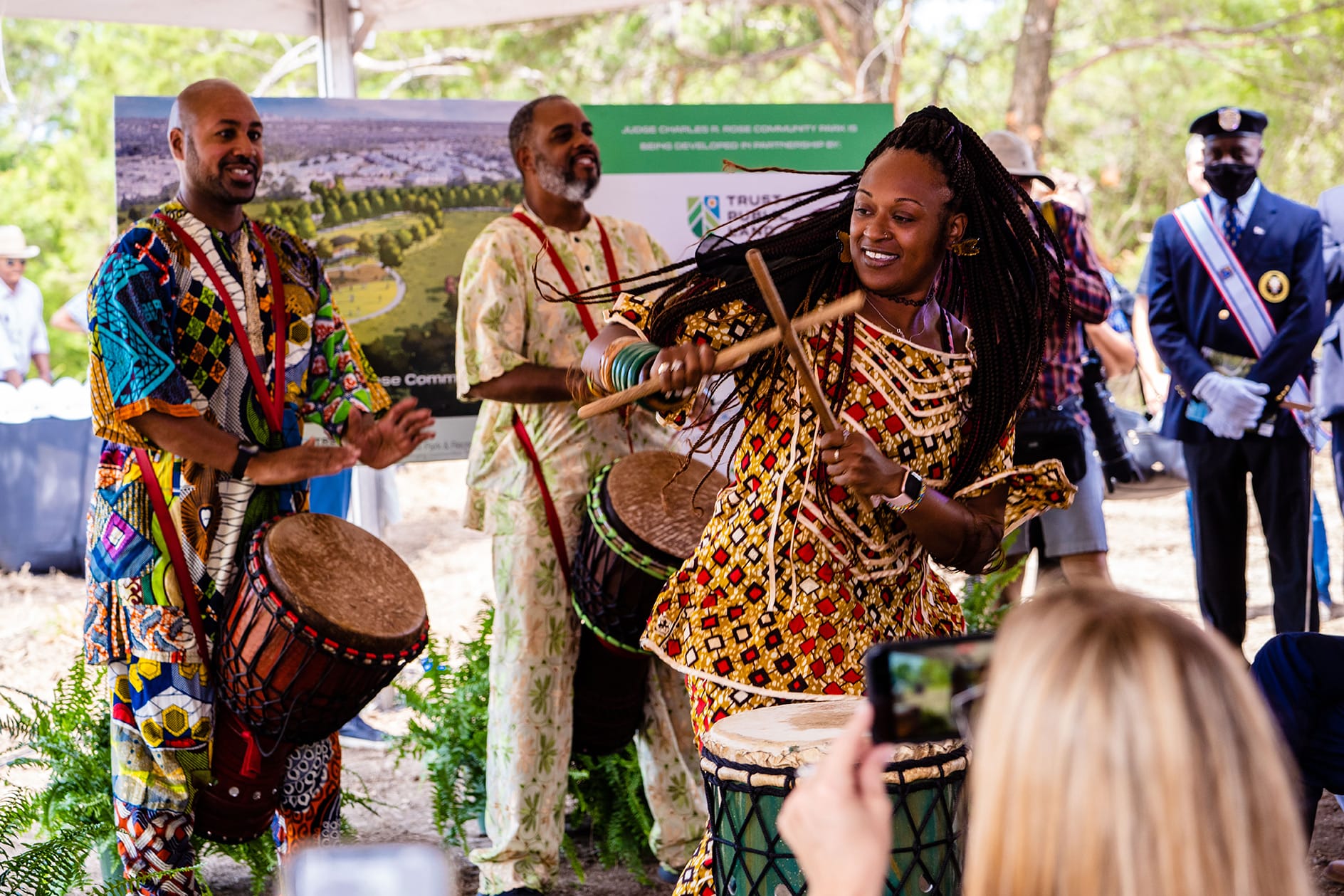
Bandan Koro, an African drum and dance ensemble, performs at the groundbreaking ceremony for Judge Charles R. Rose Community Park. Photo: Jason Flowers
A month later, at the groundbreaking for Judge Charles R. Rose Community Park, the air is thick with more than humidity: the excitement from the gathering community—more than 350 attendees, including dozens of Judge Rose’s extended family and his widow—is palpable. The bilingual event invitation reads, “We are so excited to celebrate this milestone with the Highland Hills community and see your designs come to life,” and the mood reflects this positive energy.
It’s a memorable day. Laughter accompanies beats from a local African drum ensemble. Hugs are shared between neighbors who’ve known each other their whole lives. Speeches yield cheers and tears—evidence of this project’s meaning, the fulfillment of a promise to provide a place for unity and connection. “The ceremony was such a powerful moment of community spirit,” says Kent. For Highland Hills—and southern Dallas—the wheels of change are turning. And it feels like winning.
Amy McCullough is senior writer and editor for Trust for Public Land and managing editor of Land&People magazine. She is also the author of The Box Wine Sailors, an adventure memoir.

Donate to become a member, and you’ll receive a subscription to Land&People magazine, our biannual publication featuring exclusive, inspiring stories about our work connecting everyone to the outdoors.

